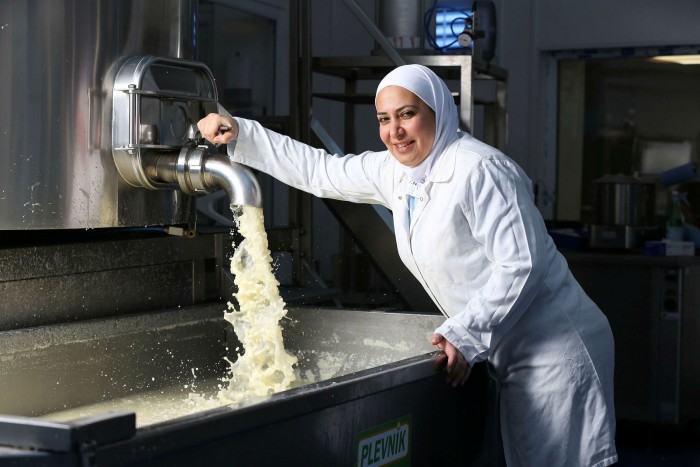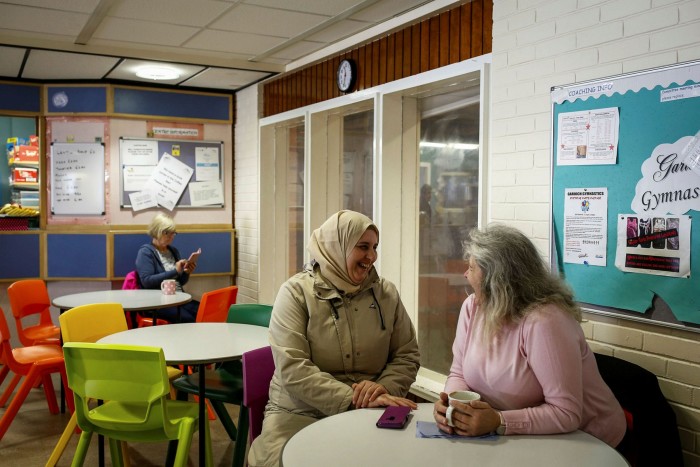Against the odds: the struggles of migrants to build a business

Roula Khalaf, Editor of the FT, selects her favourite stories in this weekly newsletter.
This article is the latest part of the FT’s Financial Literacy and Inclusion Campaign
When Razan Alsous fled the war in Syria in 2012, she had a degree in laboratory science and spoke a clutch of languages including English. “You’re more qualified than me!” concluded the local Jobcentre adviser in West Yorkshire, the place she settled with her family. But her Syrian qualifications didn’t seem to count for much in the UK job market. Without any work history in the country, she was even rejected for jobs in secretarial and admin work.
Yet giving up was not an option. She had three children to provide for and her husband was forbidden from working while his application for asylum was processed, which took two years (Alsous herself was granted leave to remain within a month). “That made me think I need to do something to support my family, just think about a way of living,” she says. Besides, “my personality cannot accept just sitting.”
She decided to start a business to make a Syrian breakfast staple: halloumi cheese. There weren’t many UK-based producers and supplies of high-quality local milk were plentiful. Banks wouldn’t lend to her but she was given a business mentor and a £2,500 loan by the government’s Start Up Loans scheme, which started in 2012 to support businesses that struggle to access other forms of finance.
She bought an ice-cream maker, which her husband (an electrical engineer) converted into a cheese vat. Only a few months after production started in a fried chicken shop, her halloumi had won a bronze medal at the World Cheese Awards. She expanded production of the subsequently named “Yorkshire Squeaky Cheese” into a factory in 2017, and her husband is now developing a semi-automated production process to boost output per hour.
FT Flic

This article is part of the FT’s Financial Literacy and Inclusion Campaign to develop educational programmes to boost the financial literacy of those most in need.
Financial literacy education gives young people the foundations for future prosperity — and can help economically disadvantaged people out of deprivation. Join the FT Flic campaign to promote financial literacy in the UK and around the world
Alsous has ended up on a well-trodden path for people who move to a new country: entrepreneurship is slightly higher among immigrants than natives in OECD countries. An OECD report published this year found the nature of immigrant entrepreneurship is also beginning to change as the skill levels of new arrivals have risen. The share of immigrants with a tertiary education has increased in nearly all EU member states and OECD countries between 2006 and 2017. There have been slight increases in the share of self-employed immigrants working in education and service sectors over the past decade, while the shares in agriculture and accommodation and food services have declined.
Though the survival rate of companies started by immigrants is on average about 3 percentage points lower than those of non-immigrants in OECD countries, examples of success stories abound. A study from 2018 by the National Foundation for American Policy found that immigrants founded or co-founded 55 per cent of the US’s “unicorns” — privately held companies with billion-dollar valuations. Research has also found that immigrants in the US punched well above their weight in terms of the number of patents they filed.

Some studies suggest immigrants have a higher tolerance for risk, which makes them more likely to have the spirit and drive both to move to a new country and to start a new business.
Other research emphasises the practical barriers and discrimination which can make it hard for new arrivals to access the traditional job market, making self-employment or entrepreneurship a forced choice.
But while success stories like Yorkshire Squeaky Cheese show what is possible with a well-timed injection of start-up cash and mentorship, many other new arrivals are held back by financial exclusion and a lack of knowledge of their new country’s system.
Alsous herself has struggled often, especially with the lack of access to capital. “What I’m saying now in small words, just quickly summarising to the victory — we had ups and downs, lots of difficulties, we hadn’t enough money to buy bigger machinery to make the work efficient, but we never stopped,” she says.
A downward spiral
A research project with Syrian refugees in Yorkshire found that while a number did start businesses, “many willing entrepreneurs had financial problems and for the vast majority of refugees hoping to enter business there is no financial support or funding available”. It was common for people to end up in “low-skilled, precarious forms of employment”.
Lucila Granada, chief executive of the charity Focus on Labour Exploitation, says it is hard enough for Britons to manage their finances while doing these sorts of jobs, let alone recent arrivals. A cleaning job might involve a 5am to 7am shift at a bank, then a 7am to midday shift at a restaurant, before waiting until the end of office hours to start the next shift. Time between shifts isn’t paid, sick pay is rare, and working hours can vary unpredictably from week to week. Combine this instability with poor English and scant understanding of the financial system and people can quickly spiral into disaster.
“There are some huge links between financial literacy, debt, poverty and the risk of exploitation,” Granada says. “Whenever there is a crisis — a health issue, a difficult life situation — it’s very common for people to end up getting into debt.”

Loans might come from family members, loan sharks or credit cards. When Granada worked in front line support, nervous people would arrive with a pile of warning letters they couldn’t read. “They get so scared, they don’t understand what is going on . . . For many it’s the first time they have a credit card.” She says it is “incredibly common” for people without English to ask their children with better language skills to help translate. “These are children who might be sitting in front of a bank representative trying to negotiate a debt, or breaking it to their parents they have a massive amount of debt. These are not easy situations for children to handle psychologically.”
Universal credit, the UK’s main benefit system, is designed to top up the earnings of the low paid. But it can add to the sense of financial chaos because unpredictable earnings often lead to fluctuating levels of benefit payments. It is also a digital service which many people struggle to deal with — and not just migrants. A government survey of almost 1,500 claimants of universal credit found that only 54 per cent were able to register their claim online unassisted. A fifth completed it online only with help, while a quarter couldn’t submit their claim online at all, mostly due to problems using or accessing devices and the internet.
“Everything is going digital,” Granada says. “The avenues for people to find information, to find someone who will help them navigate the system, all of this is narrowing and narrowing.”
Predatory lending
The lack of accessible help from the state had led to an underground industry of “self-styled street-level accountants”, as Olivia Vicol, director of the Work Rights Centre, describes them. These people can be found on most migrant social media groups, offering to help with everything from applying for national insurance numbers to universal credit and registering for self-employment.
“The market is really diverse, there are companies, there’s also lots of amateurs who straddle the bounds between care and commerce and community and business,” Vicol says. “In the worst cases, some of these accountants can be genuine predators.” While some do serious harm, she adds, it’s important to look at “why there is demand for their services to begin with”.
Maria (who did not want her real name used) says she was trafficked from Romania to the UK with her family, where they were kept in a house with their passports withheld. After they managed to escape with the help of a relative, she found work in a pillow factory. A fellow Romanian — a supervisor at the factory — charged her £500 to apply on her behalf for a national insurance number and other paperwork. She was left with so little money she was relying on food banks until she had the idea to speak to the social worker at her daughters’ school. The social worker helped her open a bank account and sign a tenancy agreement with the person from whom she was informally subletting. But another man befriended the family with the promise of good work, persuaded them to rent a flat in his name and took out loans in their name.

She says she wishes she had been able to speak English when she came: that the language barrier left her isolated and compounded her lack of financial knowledge. But she also says didn’t know how to get help and was exhausted from factory work and caring for her children. The UK does offer funding for providers of classes in English as a second language, but the funding was cut by 40 per cent between 2010 and 2019, according to the Association of Colleges. Maria eventually found help from the Work Rights Centre.
A report by the OECD in 2016 found that, in many countries, “holistic approaches to reaching migrants and their families with financial education and financial inclusion initiatives are rare”. Yet it concluded that this was “an important component of any attempt to support these vulnerable groups, reduce poverty and increase financial wellbeing and financial stability”.
Mexico is a notable example of a country that tries to help its diaspora by providing financial education through its embassies and consulates in North America. Since 2012, Mexico has also run an annual financial education week, which aims to reach Mexicans abroad and community leaders with workshops and talks.
“It’s easy to say ‘well, low-paid workers, uneducated people, it’s an issue of financial literacy, let’s teach them how to budget’, but it’s really not about that in most cases,” says Granada. “It’s about understanding how the system works, [and] definitely that requires education.” Still, she adds, even the best understanding of the system won’t resolve deeper problems such as precarious jobs and under-regulated labour markets.

Vicol says that practical support and information would help empower new arrivals to meet their ambitions, to their own benefit and that of their new home country. “No one lives their lives feeling sorry for themselves, everyone is an actor in their own story,” she says. “That narrative of the entrepreneurial self, the resilient self who will get by, find a way, who can do anything — that does people a lot of good and it helps them, it’s part of their sense of self,” she says. “I can think of all these quotes people say: ‘you never look back’, ‘I’m strong, I can do this’, it’s definitely an attitudinal thing.”
Maria is now beginning English language classes and says she still has “hope and willingness to fight” for her children. In Yorkshire, Alsous and her husband have launched new products including smoked halloumi and labneh, a spreadable yoghurt. Their factory was damaged by a storm last year and the pandemic has been tough. “Even if you change country . . . you can’t guarantee your life forever, so we are just facing all challenges,” she says. “Making things like this cheese, just [helps you] to remember to keep going, [that] life is good. It reminds you to enjoy simple things.”
The UK’s asylum purgatory
There are few people more financially excluded in the UK than asylum seekers waiting for a decision on their application. They are usually forbidden to work and must live in government-provided accommodation on a cash allowance of £39.63 per week. The government fears that, if it allowed asylum seekers to work, it would create a powerful “pull factor” for illegal immigration. But critics such as the Refugee Council say the current system leaves people in economic limbo, unable to use their skills or talents to help their new country or their families.
That limbo period is lasting longer. In the second quarter of 2014, 87 per cent of applications received an initial decision within six months, according to Oxford university’s Migration Observatory. In the second quarter of 2020, that figure was just 22 per cent. On New Year’s Eve last year, there were about 65,000 people awaiting an initial decision on their asylum claim (including main applicants and dependants) — an almost seven-fold increase from the number in mid-2010.
Razan Alsous says for her husband, an engineer who had owned his own business in Syria, “lots and lots of times he felt hopeless” while he was unable to work. “You start to lose your talents, it kills your skills.” She thinks the government should survey people’s skills when they arrive and allow them to work in key areas.
“Asylum seekers coming to any country are like people who were sinking, and they [were given] another chance of life,” she says. At that time, people will gladly work hard and use their expertise if they are given the opportunity, she argues. “Don’t leave them for . . . years until they feel their skills have been ruined and then they don’t appreciate their life.”

Comments